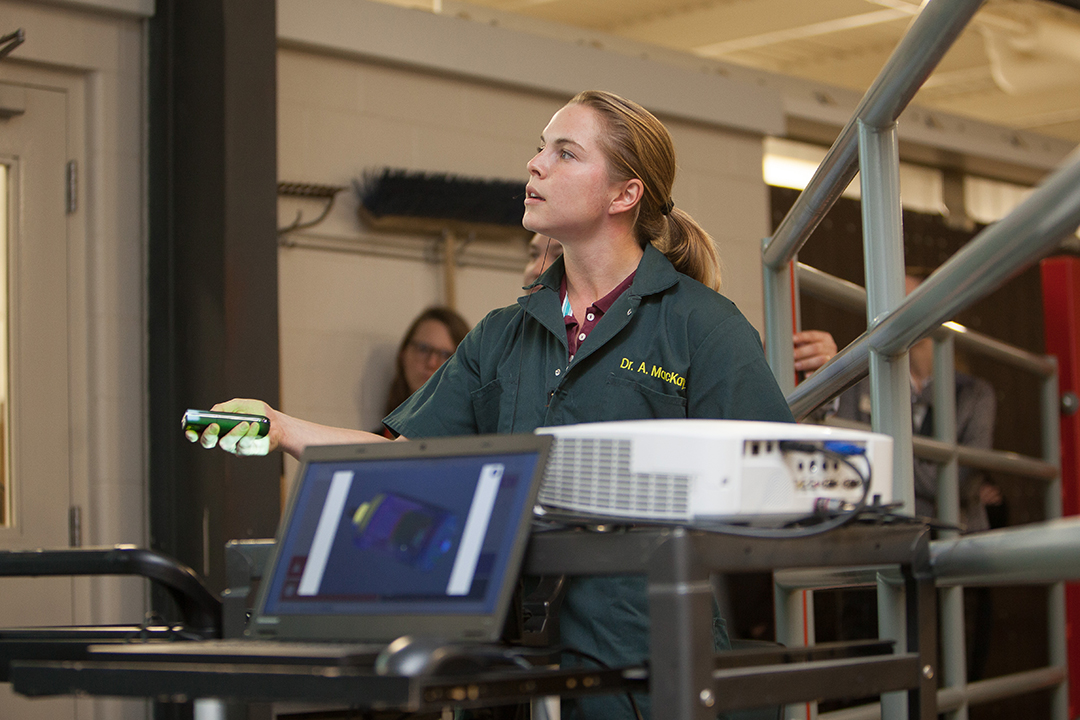
MacKay driven by helping horses
Dr. Angela MacKay was given a choice between braces and horses as a teenager. It was no contest on which option she chose.
By Katie Brickman-Young“The dentist always told me I had pretty good teeth, so naturally, I chose horses,” says MacKay, a clinical associate in equine field service at the Western College of Veterinary Medicine (WCVM).
Growing up in southeastern British Columbia, MacKay’s family owned horses, and her mother (who is now a family doctor) worked as a jockey when she was a teenager.
“My interest in animals steered me into veterinary medicine,” says MacKay. “I also spent several years in high school, shadowing a veterinarian in my hometown. Dr. Rob McLeod (WCVM ’90) was a very good mentor and encouraged my interest and helped make my decision.”
MacKay came to the University of Saskatchewan (USask) — her parents’ alma mater — and studied animal science in the College of Agriculture and Bioresources before coming to the WCVM.
“The first three years were very much book learning and were a little overwhelming, but I stayed involved in the horse industry in Saskatoon, and that kept me interested in what I was learning,” says MacKay, who counts who counts show jumping, dressage and thoroughbred racing among her interests.
The summer before her first year in veterinary school, MacKay spent most of her time exercising racehorses at Saskatoon’s Marquis Downs. There, she met WCVM equine surgeon Dr. Spencer Barber, who gently suggested the option of specializing in horses.
“I realized that I wanted to specialize so I could focus on the information of one species instead of having to learn a bit about everything,” says MacKay.
Expanding her skills and acquiring new knowledge was essential to MacKay. After completing her second year at the WCVM, she spent the summer assisting at a race track practice in California. During her fourth and final year of the Doctor of Veterinary Medicine (DVM) program, she completed externships in California, Hong Kong, Australia and Oklahoma — gaining critical experience with racehorses.
“The externships were great because they allowed me to see horse specialty practices in other areas of the world,” she says. “Going to different race tracks and seeing how horses are handled differently from the medical side was eye opening.”
After graduating from the WCVM in 2014, MacKay completed a one-year surgical internship at Oakridge Equine Hospital in Edmond, Okla. Through that experience, she became more knowledgeable in equine health and lameness — her particular area of interest.
“Oklahoma was a good choice because it was a very busy practice,” she says. “In some instances, we were seeing 25 to 30 lameness cases a day and watching horses trot and trying to figure out their problems. We would be doing 12 surgeries a day, too — it was an immersive experience in that regard.”
In 2015, MacKay returned to the WCVM to complete her Master of Science (MSc) program and residency in equine field service. For her graduate research project, MacKay explored the use of extracorporeal shock wave therapy (ESWT) for caudal heel pain with Dr. Kate Robinson, her supervisor.
“I wasn’t quite ready to leave Saskatchewan since I made a lot of friends, and it felt like home,” MacKay says. “Overall, it was a positive experience, and because I knew so many people in the horse community. There was an underlying level of trust, which is important for building those veterinarian-client relationships.”
After MacKay completed her residency in July 2018, she went on to pass her board examinations with the American Board of Veterinary Practitioners (ABVP) in October and then successfully defended her MSc thesis in February 2019.
Today, MacKay is a clinical associate with the WCVM’s Equine Field Service team — plus the hospital’s go-to expert for its standing MRI unit and equine imaging. True to her nature, MacKay is also taking more training: she’s working to complete the University of Tennessee’s intensive equine rehabilitation certificate program, which is mainly taught online.
Click here to read about Dr. MacKay's MSc research focusing on extracorporeal shock wave therapy (ESWT).
